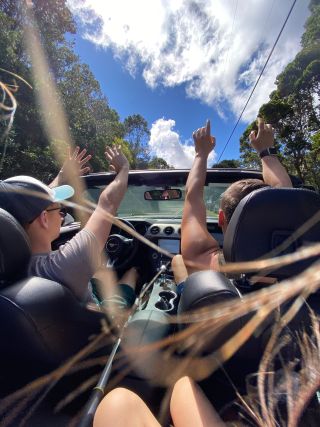Happiness
Prioritizing Pleasure
Personal Perspective: Opening ourselves to pleasure without all the guilt.
Posted November 8, 2023 Reviewed by Gary Drevitch
Key points
- Leaving room for spontaneity and the pursuit of pleasure is good for us.
- Our brains thrive on new experiences, giving us the chance to experience something with fresh eyes.
- The phrase "guilty pleasures" could be reframed to remove the guilt and prioritize the pleasure.

In a culture rife with stress and productivity mandates, it's understandable that many of us struggle with the desire to be more spontaneous and open to pleasure. Humans thrive on spontaneity. When we decide to throw caution to the wind and do something a bit out of our routine, we might doubt ourselves at first and wonder if we really should, yet often in the end we are glad we did.
And when we look back on the happiest memories of our lives, they are often unplanned moments, often when we did something ordinary, yet it felt extraordinary, and when there was a bit of risk involved that made it feel edgy and fun. Most of us can look back on silly, mischievous things we did as children or teenagers, where we did it anyway, whatever it was, and those are often the memories we look back on with the greatest sense of pleasure.
For example, I remember when I was in college and my boyfriend at the time had a friend who played the piano at a hotel bar; we joined other friends there for drinks and wore swimsuits underneath and snuck up to the rooftop to use the jacuzzi on a freezing winter night. Years later, I went to a nude beach with a dear male friend and even though the norm there was to be naked, we still felt we were breaking rules and being mischievous since we were indeed stepping out of our comfort zones of how we normally move about in the world. And even though these memories all occurred over 20 years ago, they remain vivid in my mind.
For those of us who go about our lives being responsible almost all the time, moments of rule-breaking, mischief, and guilty pleasures add flavor and color, vibrancy and richness to our lives, and often remind us of the people we once were or longed to be. You might think of a new mom, underslept and stressed, eyeing the cowboy boots on the top shelf of her closet when she goes to change her shirt for the third time that day because of milk stains and spit-up, wondering if she will ever dance again. When she gets a chance to go out, cut loose, and be a bit wild, it's freeing and it reminds her of who she was and is at her core: a joyful person who loves music and dance. By allowing ourselves to have these experiences we can bring more joy back into our daily rounds and this benefits those whose lives we touch. It's about how to live our daily lives with at least some sense of wild abandon.
The more we can do to improve neuroplasticity and strengthen our prefrontal cortex, the better for our brains, our mental and physical well-being, and our lives. By changing things up and learning or doing something new, we activate and stimulate our brains.
Breaking rules or being mischievous—especially when the level of risk is relatively low, and the consequences are minimal—can be worth it. We can break rules and engage in a sense of mischief without hurting ourselves and other people. We often engage in these sorts of behaviors when we realize that doing this activity will bring joy.
Neural pathways in the brain light up when we expose ourselves to new experiences. This is why so many of us feel inspired through travel or seeing musicians and dancers perform live or going to the very top of a tall building and seeing a panoramic view of a whole city. It's about feeling creative, getting a new perspective, and seeing with fresh eyes. Whenever we can embrace a beginner's mind and see things anew, we regain a sense of wonder.
To be spontaneous sometimes means being a little irresponsible. Perhaps it's something relatively benign like canceling an appointment when someone offers to pick you up and take a drive to the coast, or maybe it's taking a bit of a shortcut on a work project to be able to go to a concert on a weeknight.
We are heavily weighed down by "shoulds" on our to-do lists and opportunities for spontaneity call out to us and invite us to think about the "coulds" instead. This pushes us to let go. It's liberating.
It's true; we are a bit more connected to our inner child when we engage in guilty pleasures, mischief, or rule-breaking. There's a bit of testing how much we can get away with. And there is often a sense of accomplishment in finally giving ourselves permission to do something so out of the norm.
Too much of anything is never great and the same goes for this. If we’re staying up all night eating Oreos while binge-watching shows, there may be more going on underneath the surface, and what seems like pleasure might be masking pain, fear, or avoidance. Context is everything so this largely depends on the reasons for doing these things, how people feel as they are doing them and then, afterward, if they are depleted or relaxed and even energized. (Those who have a tendency toward addictive behaviors need to be careful.)
Even the phrase guilty pleasure is worthy of examination. Why should we feel guilt from pleasure? This seems connected to a work ethic that is about working until we crash and burn out, where pleasure and true time off are constantly postponed, and we have grown more and more accustomed to being on call 24/7. So, sure, guilty pleasures can seem like a fun phrase in terms of doing something we’re not supposed to do but maybe it’s time to remove the morality and judgment and focus instead on pleasure itself in a more full and whole way.




